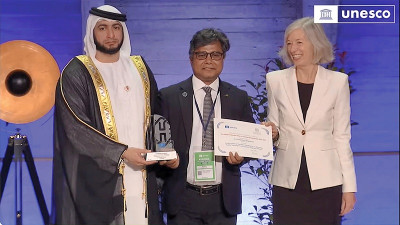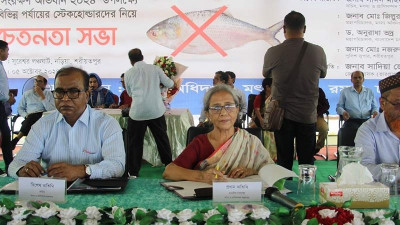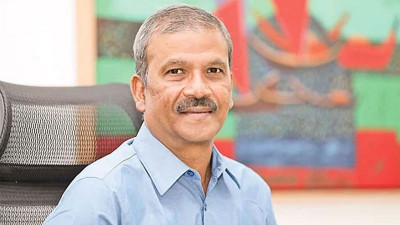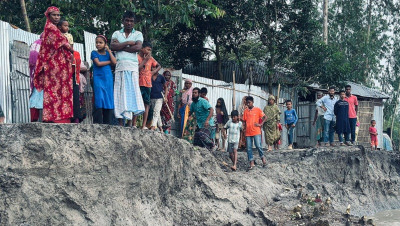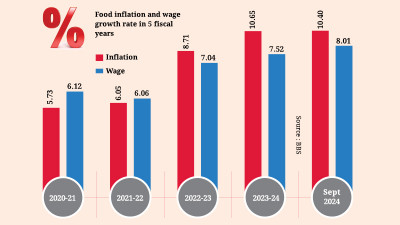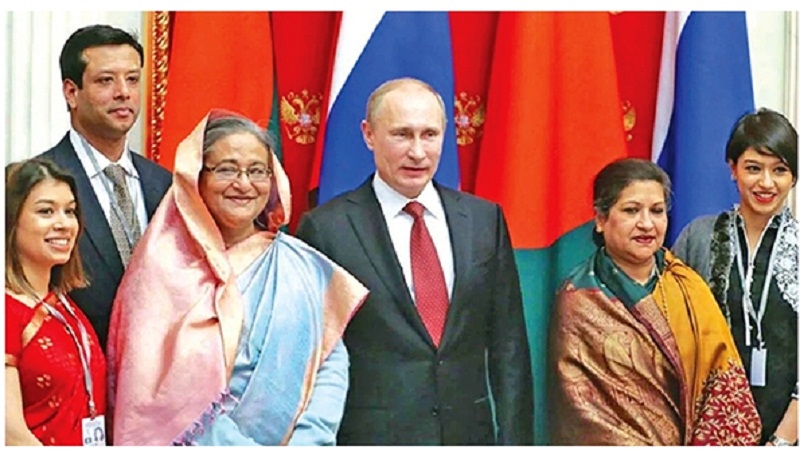 A photograph of Sheikh Hasina with her family members and Russian President Vladimir Putin. Photo courtesy: Russian Embassy in Bangladesh’s website
A photograph of Sheikh Hasina with her family members and Russian President Vladimir Putin. Photo courtesy: Russian Embassy in Bangladesh’s website In November 1983, Bangladesh expelled 18 diplomats, accusing the
Soviet intelligence agency of misconduct. However, this was not the first
instance of expelling diplomats. Earlier, during Ziaur Rahman’s regime, four
Soviet diplomats were expelled, escalating diplomatic tensions between the two
nations to their peak. This strain in relations started to ease primarily after
the Awami League came to power in 1996. Nevertheless, the change in government
led to further deterioration in bilateral relations. However, over the last
decade and a half, the Sheikh Hasina-led government has significantly elevated
the ties between Bangladesh and Russia through diplomatic efforts. Now, the
question arises whether Russia can finally break away from the Awami League’s
ties.
From the perspective of diplomatic analysts, the relationship
between Russia and Bangladesh has always been shaped by political power
dynamics. When the Awami League was in power, Russian investments saw a
noticeable jump. A review of bilateral trade in recent years supports this
trend. A key example of Russian investment under the Awami League’s rule is the
Rooppur Nuclear Power Plant. Most Russian investments in post-independence
Bangladesh have been made during Sheikh Hasina’s tenure.
The Economic Relations Division’s (ERD) annual report reveals
that since independence, Russia has pledged a total of $12.28 billion in loans
to Bangladesh. Of this, $11.38 billion was pledged to construct the Rooppur
Nuclear Power Plant alone.
Commenting on this, former diplomat Humayun Kabir told Bonik
Barta, “We share a historic relationship with Russia, dating back to the
Liberation War. While it’s true that our relations with Russia have remained
favorable under the Awami League government, our ties are still relatively
stable. We maintain relations with Russia as necessary. In the 1970s, we built
our power plants in Ghorashal with Russian support because we had no other
alternative sources. Now, the nuclear plant is also being constructed with
Russian assistance. During the Awami League’s term in 1996, we purchased
several MiG-29 fighter jets. How effectively those planes were used remains
uncertain, but there were questions about the necessity and quality of that
deal. Similar concerns surround the Rooppur project today. When it comes to
relations with Russia, we must focus on necessity and mutual interests. Beyond
that, if other factors come into play, they tend to raise questions. I don’t
foresee any hostility in our relations with Russia. However, several questions
are being raised. It is to be seen how both countries address these.”
After Bangladesh’s independence, during Sheikh Mujibur Rahman’s
rule, Russia provided assistance to Bangladesh’s energy sector. However, there
was no significant bilateral trade between the two countries until 1996. When
Sheikh Hasina’s government came to power in 1996, Bangladesh purchased eight
MiG-29 fighter jets from Russia for $129 million. When the BNP government
assumed power, they initiated corruption investigations against the Sheikh
Hasina administration over the deal. In 2001, the Anti-Corruption Commission
(ACC) filed a case. Relations between the two countries took a positive turn
again in 2009 when the Awami League returned to power.
Bilateral trade between Russia and Bangladesh fluctuated between
$960 million and $1.27 billion. Recent figures indicate a balance between
imports and exports. According to the Bangladesh Bank, the Bangladesh Bureau of
Statistics (BBS), and the Export Promotion Bureau (EPB), bilateral trade
between Bangladesh and Russia amounted to $957 million in FY 2022-23. This
included $497 million in imports from Russia and $460 million in exports to
Russia. In FY 2021-22, bilateral trade reached $1.118 billion, with $480
million in imports from Russia and $638 million in exports from Bangladesh.
Bilateral trade stood at $1.147 billion in the 2020-21 fiscal
year (FY), $1.269 billion in FY 2019-20, and $1.198 billion in FY 2018-19.
Regarding bilateral trade agreements, Russia provided the
highest loan assistance to finance Bangladesh’s energy sector. Russia financed
the 2,400 MW nuclear power plant in Rooppur, with a total project cost of
$12.65 billion. Bangladesh and Russia signed a loan agreement of $11.38 billion
(Russian loans finance 90 percent of the project). As of September this year,
Bangladesh had received $7.8 billion from Russia, representing 64 percent of
the total loan. Additionally, Russia supplies most of the technology and
imports for this project. The loan utilization period will end on December 31
of this year.
Aside from trade, Russia has supported the Awami League in the
past three contested elections. Additionally, in the Russian presidential
elections, Sheikh Hasina’s government sent Bangladesh’s Chief Election
Commissioner to observe the process. In March of this year, former Chief
Election Commissioner (CEC) Kazi Habibul Awal traveled to Russia for an
eight-day visit.
Regarding the evolving relationship between Bangladesh and
Russia, BNP Secretary General Mirza Fakhrul Islam Alamgir told Bonik Barta,
“The relationship between two countries depends on mutual understanding,
respect, and interests. Earlier, we did not have any major agreements with
Russia. However, since the Rooppur Nuclear Power Plant is nearing completion,
there are obvious shared interests between the two nations. It must be managed
by safeguarding our own interests. We believe that it is not wise to maintain
hostile relations with any country. Working in the best interests of the nation
is the way forward.”
Russia supported Bangladesh during the Liberation War, speaking
in favor of the country at UN Security Council sessions. When the United States
of America attempted to deploy the Seventh Fleet, Russia countered by sending
its naval fleet. After independence, Russia aided Bangladesh in reconstruction,
notably assisting in removing mines from the Bay of Bengal that year. In the
1970s, Russia’s construction of power plants, such as those in Siddhirganj and
Ghorashal, significantly contributed to the country’s infrastructure. However,
after the assassination of Bangabandhu Sheikh Mujibur Rahman, Russia’s
significant support for Bangladesh waned.
In 1980, during Ziaur Rahman’s presidency, Bangladesh expelled
four Soviet diplomats. Bangladeshi intelligence agency accused them of bringing
sophisticated communication devices from the Soviet Union to facilitate contact
with Soviet spies in Bangladesh. Two more Soviet diplomats were expelled two
months after Ziaur Rahman’s assassination, again based on intelligence agency
reports. In 1983, the largest expulsion occurred, with 18 Soviet diplomats
being asked to leave the country.
General Hussain Muhammad Ershad’s regime did not witness
significant improvements in relations with Russia, as Bangladesh continued to
receive financial investments and assistance primarily from Western nations.
In this context, Jatiya Party Chairman Golam Mohammad (GM)
Quader told Bonik Barta, “There has been no significant deterioration in
Bangladesh’s relations with Russia until now. Leadership changes sometimes lead
to issues. However, during my tenure as a minister, I saw Russia showing
interest in trade with us, especially in garments and other sectors. However,
due to banking issues, such trade could not proceed as planned. They were
unable to receive payments properly when goods were exported from Bangladesh.
Under Sheikh Hasina’s government, Russia provided loans for the country’s
largest mega projects. Although there have been concerns over the safety and
high costs of some of these projects, particularly the nuclear power plant,
there has been no indication of any major rift between the interim government
and Russia so far. I remain hopeful that relations will not deteriorate in the
future.”
Tensions have recently arisen over Bangladesh’s energy sector
relationship with Russia, centered on the Rooppur Nuclear Power Plant loan.
Bangladesh has requested an extension to repay the principal, but Russia has
not responded favorably. Instead, it has sought to receive interest payments in
Chinese currency. This dispute over loan repayments has been ongoing for more
than two years, but complications have intensified following the fall of the
Sheikh Hasina government. The interim government has initiated a review of
various agreements related to the power sector, including the Rooppur project.
Consequently, there are concerns that Bangladesh may face further strain in its
dealings with Russia.
Bilateral trade between the two countries expanded significantly
with the construction of the Rooppur Nuclear Power Plant. After Sheikh Hasina
took power in 2009, a proposal for constructing the plant was passed in the
National Parliament in 2010. In November 2011, an intergovernmental agreement
was signed with Russia to construct the nuclear power plant. During the last
decade and a half under Sheikh Hasina’s rule, the plant secured international
approvals, overcame diplomatic pressures from neighboring countries, and
established a joint coordination committee, all supported by Russian loans.
Bangladesh received substantial financial aid from Russia, which was instrumental
in drafting the plant’s design, importing machinery, providing technical
assistance, and training personnel, among other aspects. The Sheikh Hasina
government further solidified diplomatic relations with Russia by seeking
assistance for a second nuclear power plant last year, to which Russia gave its
assurances.
Dr. Shahab Enam Khan, professor of International Relations at
Jahangirnagar University, told Bonik Barta, “Bangladesh’s relations with Russia
have largely been leader-centric. However, this does not mean that our
relations are narrow in scope. Bangladeshi students study there, and we
maintain military ties with Russia. The relationship has also expanded in the
trade sector, especially in diesel and fuel supply. However, our debt burden
with Russia has increased due to the Rooppur Power Plant. If the power plant is
shut down, the investment made so far will be wasted. The government should
take the necessary steps to keep it operational. I do not foresee any major
disruptions or significant fluctuations in Bangladesh’s relations with Russia,
though the scope of the relationship may not expand much beyond the current
levels.”
Following the student-people uprising on August 5, Sheikh Hasina was ousted and left the country. Concerns regarding Bangladesh’s relationship with Russia are rising again. However, Russia’s Ambassador to Bangladesh, Alexander Mantytskiy, reassured that Russia would continue to stand by Bangladesh in the international arena. On August 27, he met with Dr. Muhammad Yunus in Dhaka for a courtesy visit, congratulating him on his appointment as the head of the interim government. Mantytskiy also reiterated Russia’s commitment to bilateral cooperation in various sectors, particularly energy, agriculture, and education.

